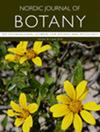Phylogenetics of Cruckshanksia and Oreopolus (Rubiaceae) based on nuclear and plastid DNA sequences
IF 1.1
4区 生物学
Q3 PLANT SCIENCES
引用次数: 0
Abstract
Cruckshanksia Hook. & Arn. and Oreopolus Schltdl. Rubiaceae (Rubioideae – Coussareeae), endemic genera of Chile and Andean Argentina, have historically been highly taxonomically unstable. Molecular analyses have confirmed Oreopolus as the sister group of Cruckshanksia; however, the relationships among its species are still not resolved because previous studies have not considered all species of the genus and the published topologies have many unsupported nodes. For this reason, we carried out a phylogenetic study with all the species currently recognized by recent revisions, using two nuclear DNA regions and five plastid regions, to elucidate the relationships between species. In addition, the evolutionary history of the group was estimated based on divergence times, and a character reconstruction was performed. The results corroborate that Oreopolus is the sister group of Cruckshanksia. Cruckshanksia is monophyletic and composed of two principal clades. Clade I is composed of Subclade I (C. pumila and C. verticillata) associated with C. montiana; Clade II is composed of Subclade II (C. palmae and C. macrantha) and Subclade III (C. lithiophila and C. hymenodon). With 81% probability the common ancestor of the genus Cruckshanksia had petaloid appendices associated with two independent lines of evolution. The probability that the common ancestor of the Oreopolus‒Cruckshanksia clade had equal calyx lobes is 50%.基于核DNA和质粒DNA序列的Cruckshanksia和Oreopolus(茜草科)系统进化论
Cruckshanksia Hook. & Arn.和 Oreopolus Schltdl.茜草科(Rubioideae - Coussareeae)是智利和阿根廷安第斯山区的特有属,在分类学上一直很不稳定。分子分析已证实 Oreopolus 是 Cruckshanksia 的姊妹群;然而,由于之前的研究没有考虑该属的所有物种,且已发表的拓扑结构中有许多不支持的节点,因此其物种之间的关系仍未得到解决。为此,我们利用两个核 DNA 区域和五个质体区域,对目前最新修订确认的所有物种进行了系统发育研究,以阐明物种之间的关系。此外,还根据分化时间估计了该类群的进化历史,并进行了特征重建。结果证实,Oreopolus 是 Cruckshanksia 的姊妹群。Cruckshanksia 是单系的,由两个主要支系组成。支系 I 由与 C. montiana 相关的支系 I(C. pumila 和 C. verticillata)组成;支系 II 由支系 II(C. palmae 和 C. macrantha)和支系 III(C. lithiophila 和 C. hymenodon)组成。Cruckshanksia属的共同祖先具有瓣状附属物的概率为81%,这与两条独立的进化路线有关。Oreopolus-Cruckshanksia 支系的共同祖先具有相同萼裂片的概率为 50%。
本文章由计算机程序翻译,如有差异,请以英文原文为准。
求助全文
约1分钟内获得全文
求助全文
来源期刊

Nordic Journal of Botany
生物-植物科学
CiteScore
1.90
自引率
11.10%
发文量
100
审稿时长
2 months
期刊介绍:
Nordic Journal of Botany publishes original contributions on all aspects of the taxonomy, evolution, conservation, ecology and biogeography of plants (including algae and bryophytes) and fungi.
 求助内容:
求助内容: 应助结果提醒方式:
应助结果提醒方式:


